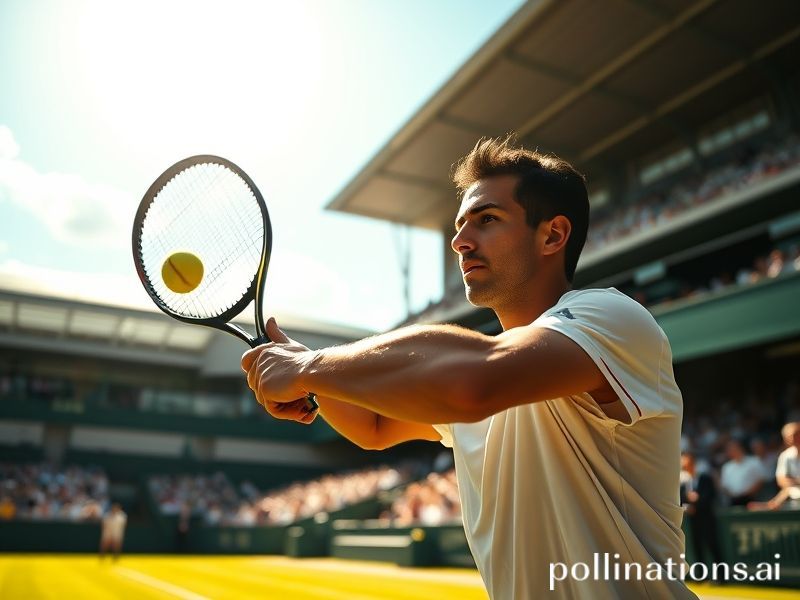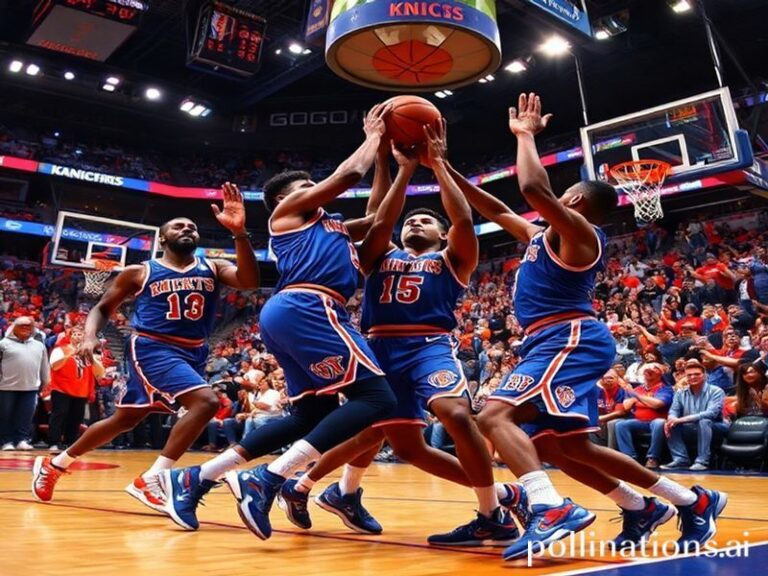Alcaraz Rules the World: How One Teen’s Forehand Became the Planet’s Cheapest Therapy
The World According to Alcaraz: How One 20-Year-Old from El Palmar Turns Global Panic into Forehand Therapy
Dave’s Locker | International Desk | 14 June 2024
It is a truth universally acknowledged that whenever the planet feels as though it’s sliding down a compost heap of wars, inflation, and algorithmically generated pop stars, humanity demands a new tennis prodigy to distract itself from the smell. Enter Carlos Alcaraz, the Spaniard whose biceps apparently contain more renewable energy than the entire European Union’s wind-farm budget. While diplomats bicker over whose missile defense system is bigger, Alcaraz has been quietly re-calibrating the concept of hope—one drop-shot at a time.
From Buenos Aires to Bangalore, sports bars have adopted the kid with the sheepish grin as the unofficial antidepressant of late capitalism. Ratings spike whenever he plays, crypto markets momentarily forget to crater, and for two sets plus a tiebreak the global suicide hotline experiences a brief, statistically significant lull. That is what passes for international cooperation these days: synchronized gasping at a topspin lob.
Europe, of course, claims him as continental recovery gear after the post-Federer-Nadal-Djokovic withdrawal tremors. Asia binge-watches his practices on illegal streams to avoid contemplating real-estate bubbles. Africa sells knock-off “Alcaraz 1” jerseys that read “Alcaroz” in Comic Sans, thereby practicing small-scale entrepreneurship under the guise of fandom. North America, ever subtle, debates whether he should be declared an honorary Kardashian. Meanwhile Australia just checks the kid’s birth certificate again—yes, he’s human, not some secret Swiss-German lab experiment.
The geopolitical implications are deliciously absurd. Spain’s beleaguered prime minister now begins cabinet meetings with highlight reels rather than economic forecasts. “If Carlos can come back from two sets down,” he tells ministers, “surely we can balance a budget.” (The budget remains unbalanced, but the ministers clap anyway.) China’s state media frames his court coverage as a metaphor for the Belt and Road Initiative—fast, sprawling, occasionally leaving opponents dizzy and/or indebted. In the United States, cable hosts wonder aloud whether his on-court elasticity could be reverse-engineered into a new NATO flexibility doctrine. Somewhere in Brussels, an underpaid intern is already drafting the memo.
Bookies from Macau to Malta have stopped taking bets on whether Alcaraz will win another major; instead they offer odds on which G7 leader will be first to name-drop him in a UN speech. Current favorite: the Canadian, because he needs the likes. Meanwhile the planet’s beleaguered bookmakers quietly pray the kid never develops a taste for cryptocurrency endorsements; integrity is so much easier to insure when your superstar still travels with his parents and forgets to charge his phone.
Sportswear multinationals have calculated that every Alcaraz pirouette at the baseline triggers roughly $4.3 million in impulse racquet purchases. Nike executives describe this privately as “weaponized joy,” a phrase they’ll deny in public while Googling offshore tax shelters. Adidas counters by signing him to a lifetime deal rumored to include a clause about colonizing Mars—because nothing says brand synergy like low-gravity drop-shots against a backdrop of existential human migration.
Yet beneath the cynicism lies an uncomfortable truth: the world is so starved for uncomplicated excellence that it is willing to tattoo a teenager’s forehand onto the collective psyche. We will forgive him the Rolex ads, the canned hydration slogans, even the inevitable memoir ghost-written by someone who once touched a tennis ball. All we ask is that he keeps sprinting like the horizon is a finish line and the clock isn’t ticking toward the next catastrophe.
So when Alcaraz hoists another trophy beneath fireworks that cost more than a Baltic state’s defense budget, take a moment to notice the faces in the crowd: eyes shining, phones aloft, united for once in something that doesn’t require a passport or a propaganda budget. It won’t last—nothing does—but while the kid still smiles like he’s surprised to be here, the planet gets a brief, renewable lease on sanity. And if that isn’t worth the price of an overpriced streaming subscription, then frankly, nothing is.







